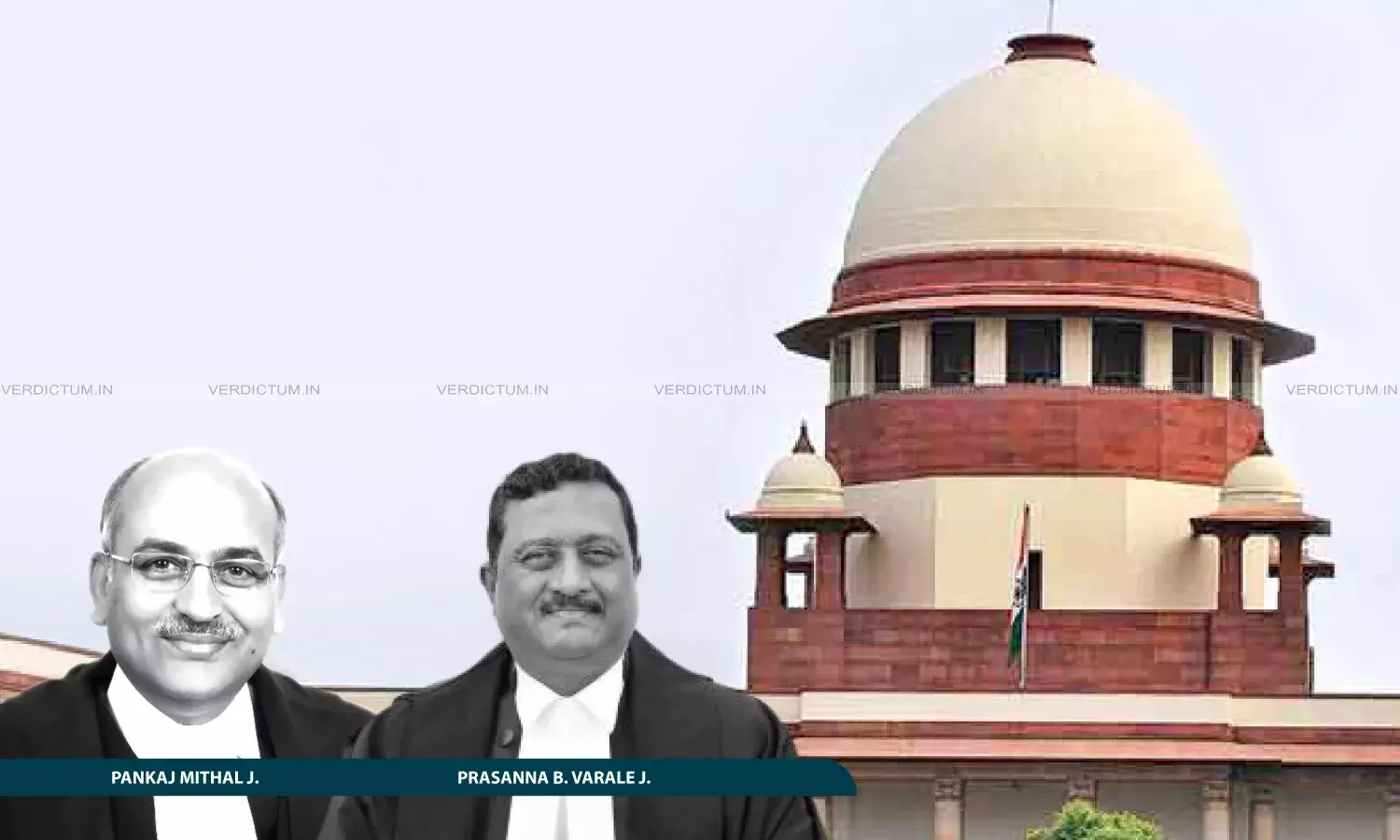Decree Of Declaration Of Civil Death Doesn’t Fix Precise Date Of Death: Supreme Court
The appeal before the Supreme Court was filed by the appellants assailing the judgment directing the appellants to issue an appointment order to a man for a suitable post, by treating the date of death of his father as September 1, 2012, i.e., the day on which he went missing.

Justice Pankaj Mithal, Justice Prasanna B. Varale, Supreme Court
While considering a service matter, the Supreme Court has reiterated that the decree of declaration of civil death only recognises the fact that the person is presumed to be dead after expiry of seven years of disappearance, without fixing any precise date or time of death.
The appeal before the Apex Court was filed by the appellants assailing the judgment directing the appellants to issue an appointment order to the second respondent on a suitable post, by treating the date of death of his father as September 1, 2012, i.e., the day on which he went missing.
The Division Bench of Justice Pankaj Mithal and Justice Prasanna B. Varale held, “In LIC Vs. Anuradha, it has been laid down in matters of civil death, the question of the date or time of the death must be determined on the basis of direct or circumstantial evidence, and not on mere assumption or presumption. The burden to prove the date or time of the death lies upon the person who makes such an assertion of death. It has been further clarified in the aforesaid case that the decree of declaration of civil death only recognizes the fact that the person is presumed to be dead after expiry of seven years of disappearance, without fixing any precise date or time of death.”
Advocate Gagan Sanghi represented the Appellant, while Advocate Chitra Parande represented the Respondent.
Factual Background
It was the case of the appellants that the date on which the father of the respondent went missing i.e. September 1, 2012, cannot be treated as the date of his death. In cases of civil death, a person will be presumed to be dead only if his whereabouts are not heard of for seven years from the date the person went missing. Therefore, the High Court manifestly erred in treating the date on which the father went missing as the date of his death. There was no evidence on record to prove the date of his death.
On the contrary, it was the case of the respondent that the respondent son could not have sought a decree declaring the death of his father prior to 2019, as the statutory period of seven years had to first elapse. It was submitted that the decree declaring the death of his father, passed by the Court of Civil Judge, would relate to the date on which his father went missing.
Reasoning
The Bench pursued the decree of the Civil Court, which recorded that the father of the second respondent went missing on September 1, 2012. Consequently, the suit was decreed, thereby declaring him to be dead. However, the decree was completely silent on the specific date of death of the father of the second respondent, and the civil court had not declared him to be dead as of September 1, 2012.
The Bench noted that the second respondent had not asserted any specific date or time of the death of his father, nor had he adduced any evidence in this regard. Therefore, the date or time of the death of the father of the second respondent remained uncertain. “Section 108 of the Indian Evidence Act, 1872, states that in cases of civil death, the death will be presumed to be after the expiry of seven years from the date the person went missing. Hence, as per Section 108, he will be presumed to be dead on the expiry of 7 years from the date he disappeared or went missing unless contrary or specific date of death is proved by adducing cogent evidence”, it noted.
The Bench was of the view that the father of the second respondent would be deemed to have died a civil death upon the expiry of seven years from the date he went missing i.e. September 1, 2019. “It is pertinent to note that despite having gone missing, he was treated to be in continuous service and he duly retired on 31.01.2015. The family members were paid all the retiral dues and have also been receiving monthly pension. In these circumstances, when the respondent No.2 has accepted that his father had retired, he cannot claim compassionate appointment.”
Allowing the appeal, the Bench left it open to the appellants to consider the case of the respondent son for appointment for any suitable post within its jurisdiction, independent of a claim for compassionate appointment.
Cause Title: The Commissioner, Nagpur Municipal Corporation v. Lalita (Neutral Citation: 2025 INSC 1280)
Appearance
Appellant: Advocate Gagan Sanghi, AOR Rameshwar Prasad Goyal
Respondent: Advocate Chitra Parande, AOR Shishir Deshpande, Advocates Nilakanta Nayak, Amit Yadav, Kaushal Narayan Mishra, Naman Tandon, Siddharth Dharmadhikari, AOR Aaditya Aniruddha Pande, Advocate Shrirang B. Varma

